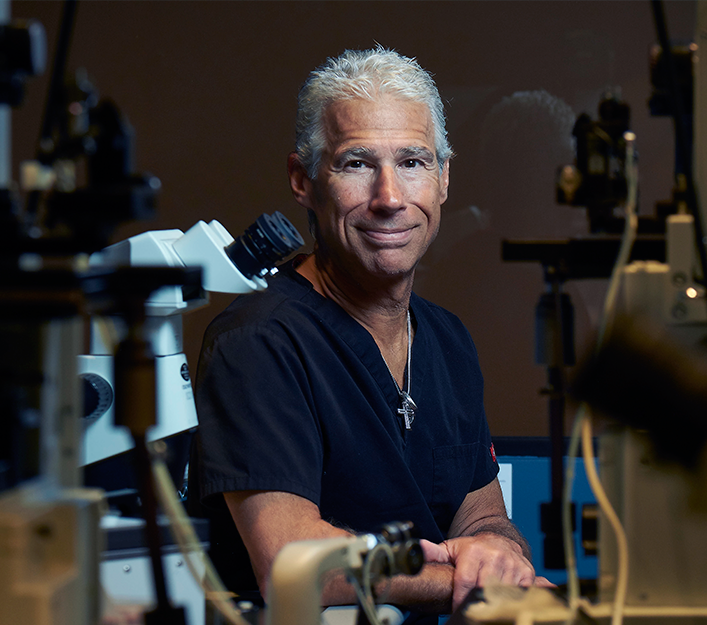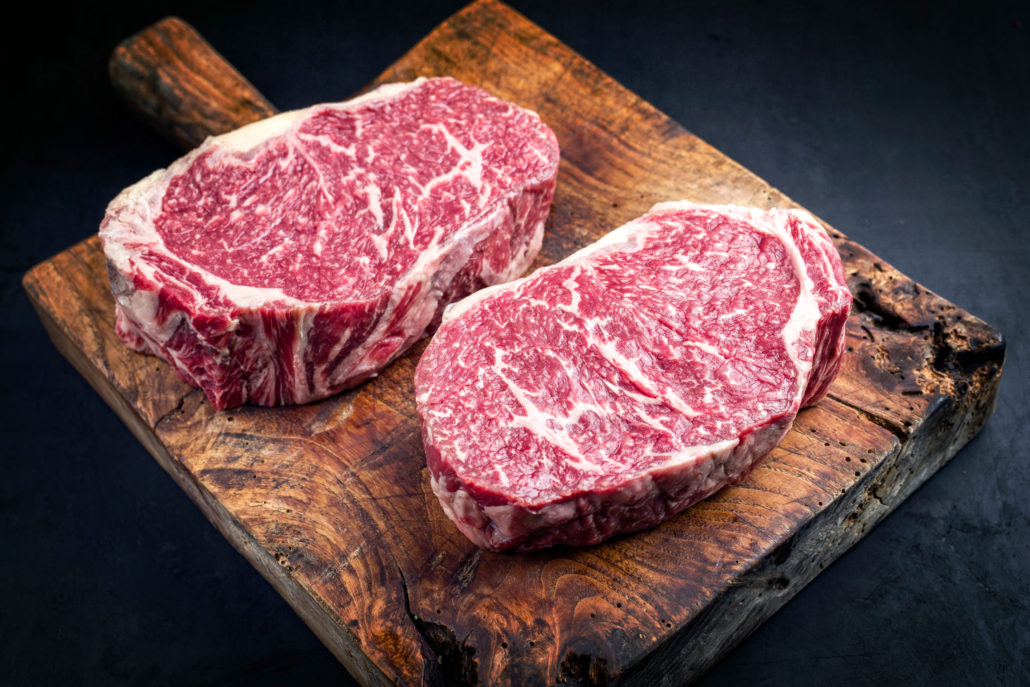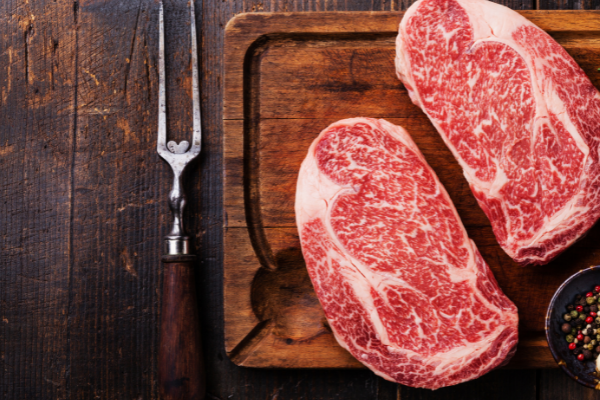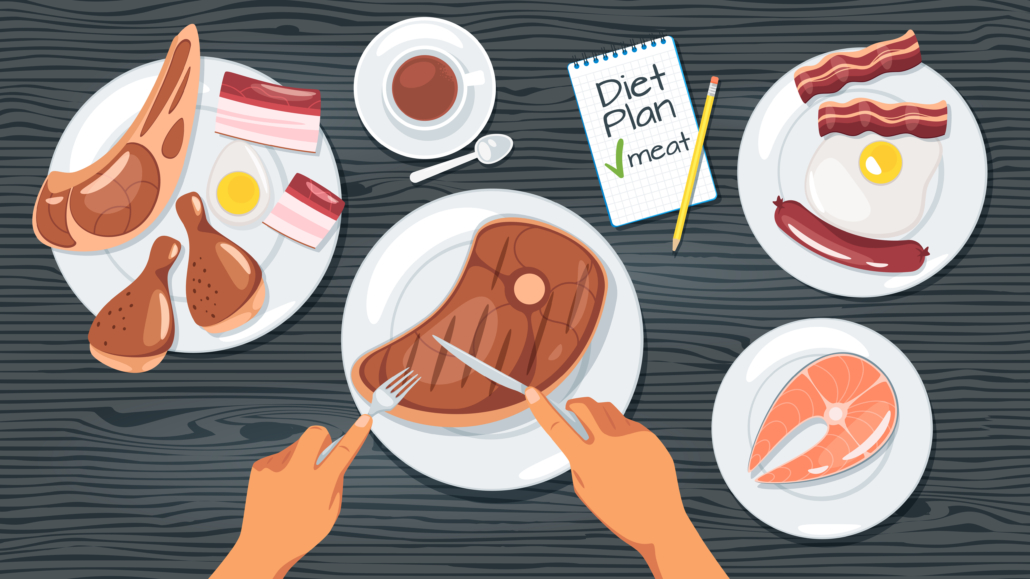We include products in articles we think are useful for our readers. If you buy products or services through links on our website, we may earn a small commission.
What is the Carnivore Diet?
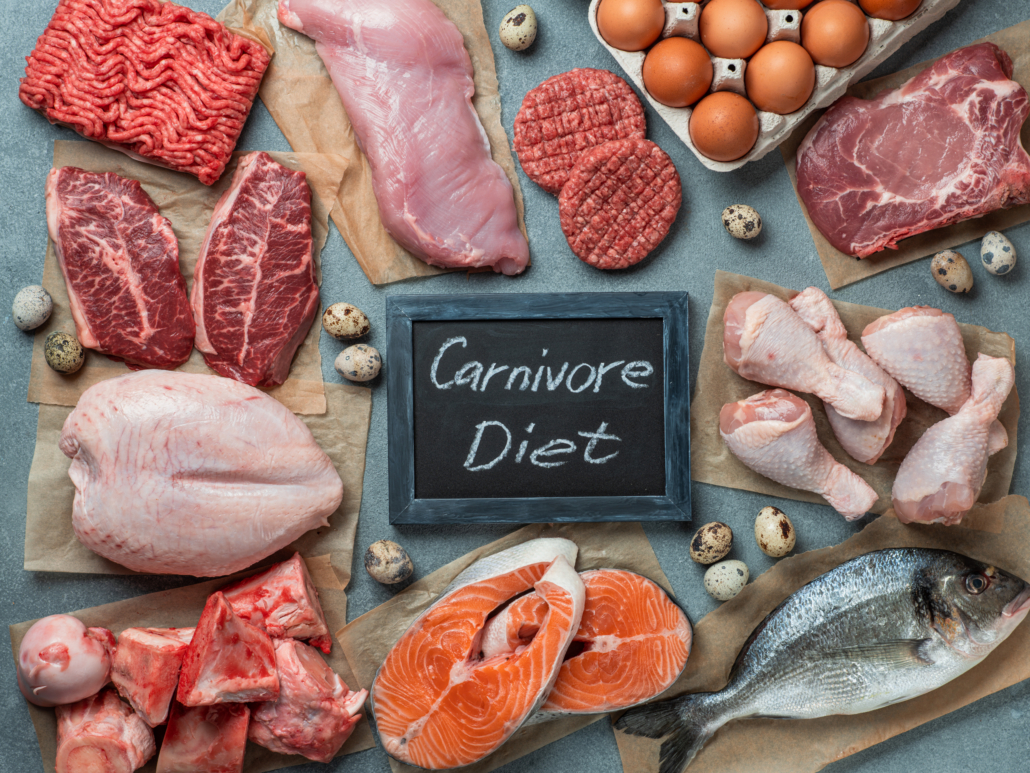
We’ve all heard the contemporary diet “rules” about getting in your daily dose of fruits, veggies, and grains. But there’s a new diet on the rise – one that turns the old nutritional paradigm upside down. One that says goodbye to any and all carbohydrates and advises that you eat meat – and only meat. Que, The Carnivore Diet.
A carnivore diet flies in the face of all of the conventional nutritional advice. But as it turns out, this meaty diet is something we should all be sinking our teeth into. Why? Well, the carnivore diet might just be the secret to optimizing nearly every facet of your health and well-being.
Let’s take a look at exactly what happens to your body when you take the plunge into a carnivore diet and how it might be the secret to better health.
Table of Contents
What Is the Carnivore Diet?
A carnivore diet consists of eating 100% animal foods. No fruits or vegetables. No bread or grains. No nuts or seeds. Strictly foods sourced from animals. Some even say only animal flesh. But most admit some flexibility for dairy, eggs, and the like.
This way of eating stems from the idea that our ancestors thrived on a hypercarnivorous diet of fatty animals for nearly two million years. Don’t believe us? Try foraging for kale and blueberries in the middle of a Norweigan winter.
And take a look below at the calorific return rate of different food types per hour spent trying to obtain those foods. Notice how the top 7 are all from animal sources.
Truth is that before the modern agricultural revolution that began 10,000 years ago, and with vast developments taking place in the past hundred or so years, there were very few reliable sources of wild plant foods that could deliver calories and nutrients anywhere near the return on energy investment we get from animal foods.
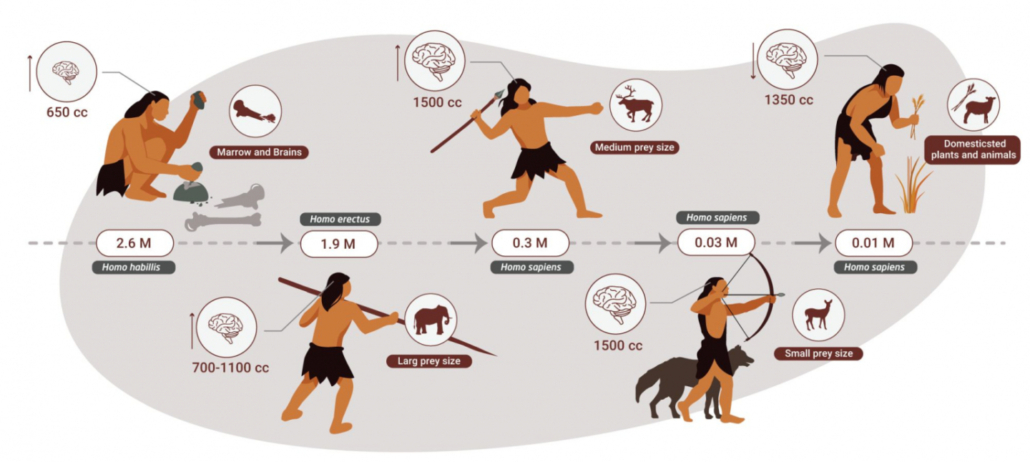
Source: Dr Miki Ben Dor
The Pleistocene, ranging from 2.58 million to 11,700 years ago, during which the human species developed, was inhabited by giant land animals called megafauna. Twenty-foot tree sloths, mastodons and twice as large as modern elephants, one ton chinchillas were all easy pickings for early humans once we learned to organize and hunt.
Given the limited access to plant-based foods for much of the year over vast parts of the globe, and the nutritional power of animal foods like those below, it’s no wonder that evolutionary forces led the human species evolve as carnivores.
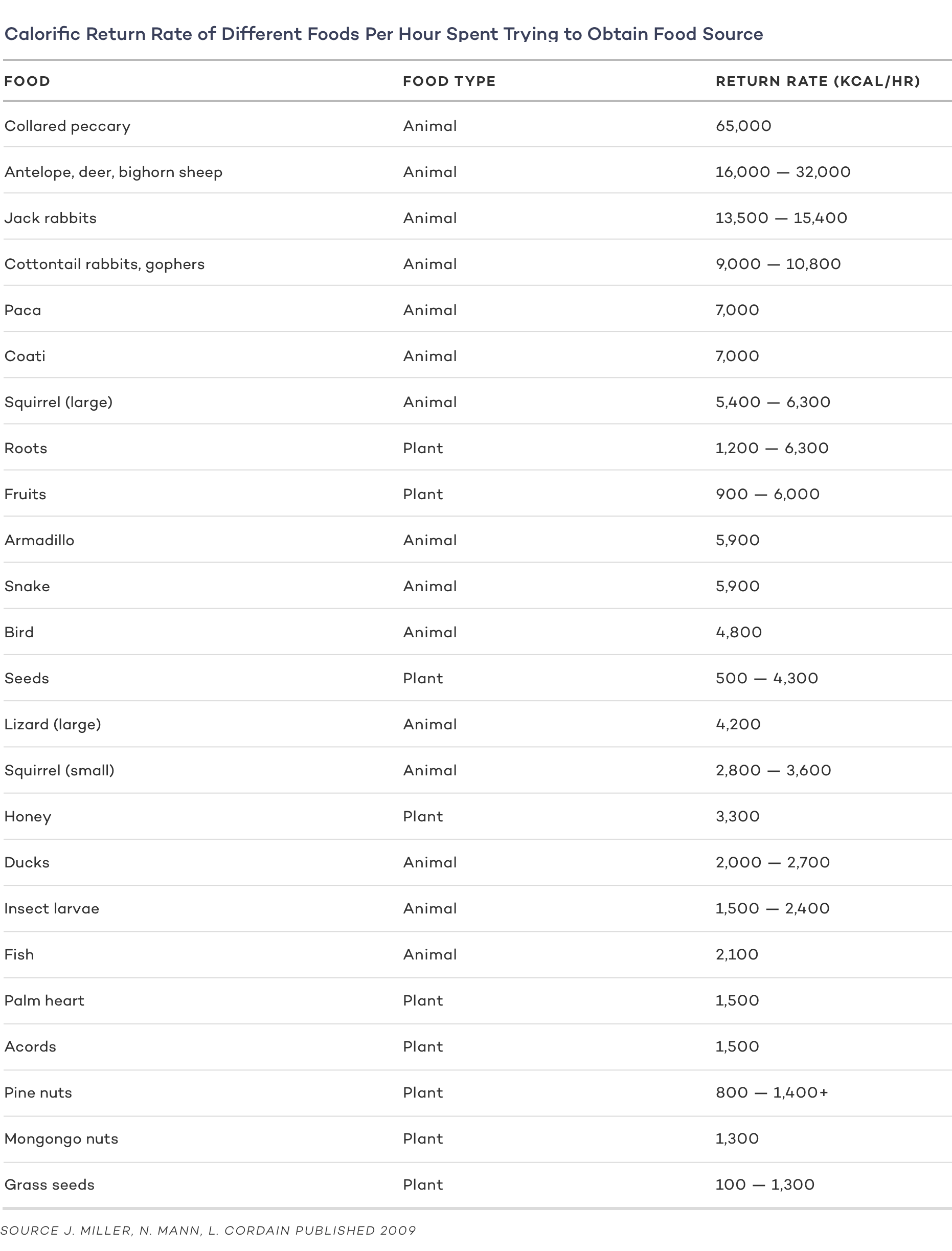
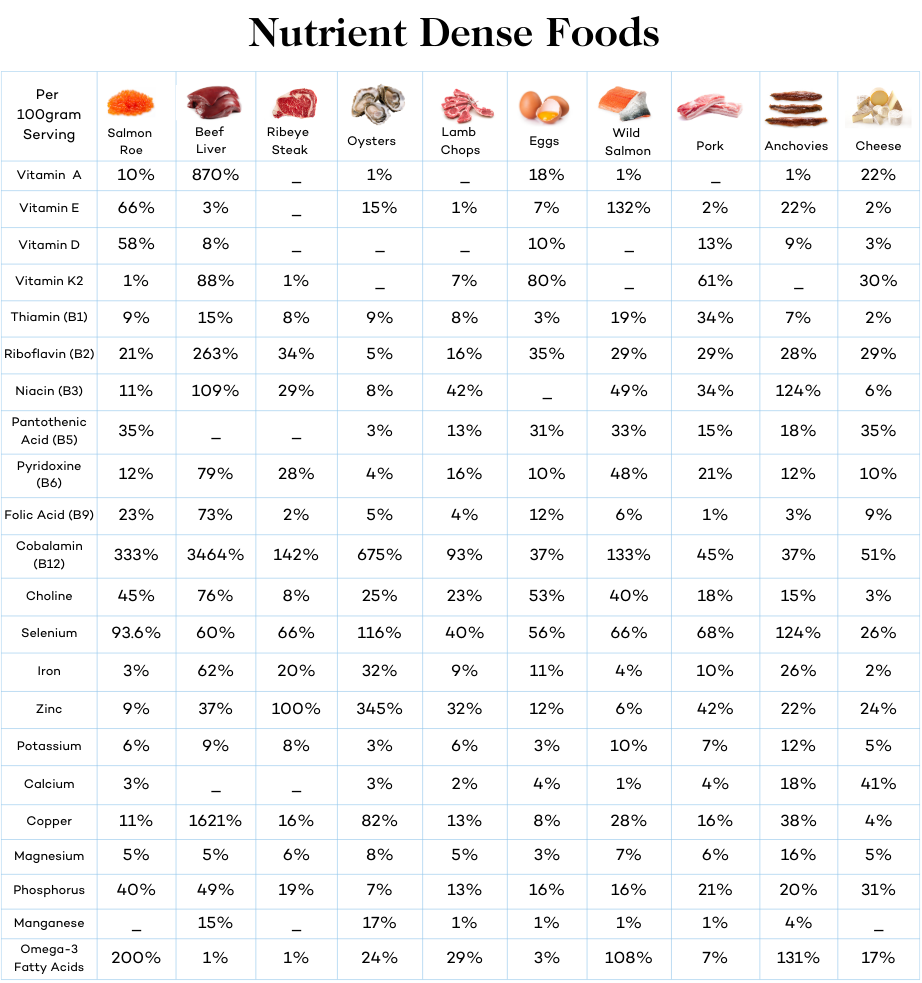
The evolutionary advantage of carnivory is due to the fact that you get much more calories per hour spent gathering food when you eat meat.
“Evolutionary advantage,” you say! But what about the many millions of herbivore animals that roam the plains? These are all ruminants, or foregut digesters. This means that these animals have specific bacteria in their digestive systems that convert carbohydrates to fat before it’s even absorbed.
So really, cows and gorillas are essentially following a ruminant version of the keto diet.
What Are the Health Benefits of the Carnivore Diet?
The carnivore diet has been linked to numerous impressive health benefits.
The most comprehensive study to date is from 2021 out of Harvard University. Researchers analyzed self-reported data from 2,029 individuals consuming a carnivore diet for at least six months. [19]
Lead researchers Dr. Belinda Lennerz and Dr. David Ludwig concluded: “Contrary to common expectations, adults consuming a carnivore diet experienced few adverse effects and instead reported health benefits and high satisfaction.” [20]
Some of the notable results included
- 93% improved or resolved obesity and excess weight
- 93% improved hypertension
- 98% improved conditions related to diabetes
- 97% improved gastrointestinal symptoms
- 96% improved psychiatric symptoms
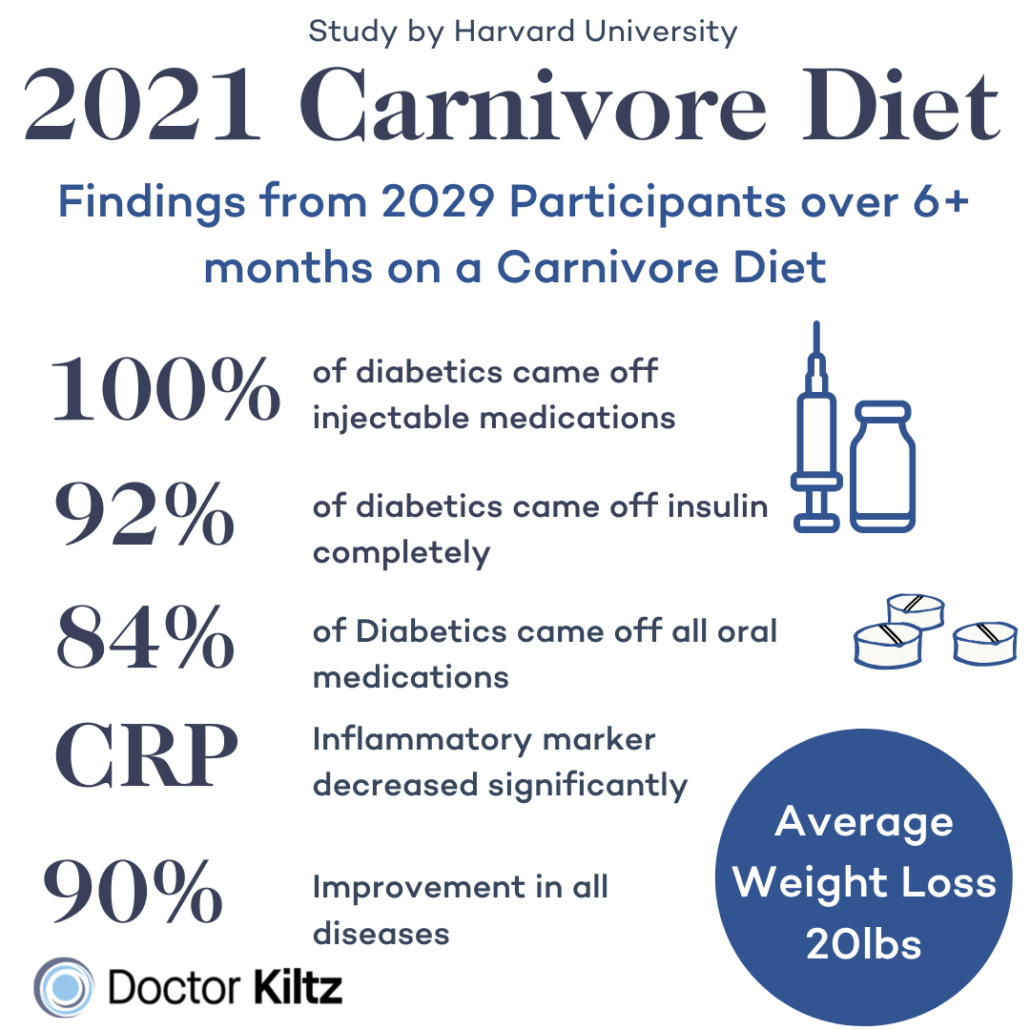
Now, let’s take a closer look at some of the specific mechanisms for these benefits.
The Carnivore Diet Can Increase Insulin Sensitivity
Insulin is the hormone responsible for moving glucose out of your bloodstream and into your cells where it’s either used as energy or stored as fat.
When you consistently consume carbohydrates and sugar causing spikes in your blood sugar, your cells can become less sensitive to insulin. This is called insulin resistance.
A decrease in insulin sensitivity can create a domino effect – increasing inflammation, disrupting important hormones, and setting the stage for a number of chronic health disorders. But cutting out carbs and following the carnivore diet can reset your ability to respond to insulin and reverse any insulin resistance.
The Carnivore Diet Can Help You Lose Weight
The carnivore diet can be a powerful and safe way to shed any extra pounds. The carnivore diet is particularly powerful when it comes to weight loss for a few reasons.
- Increased satiation: Calories that come from protein and fat take longer for your body to break down – helping you feel fuller for longer. Calories that come from animal sources simply give you more bang for your buck since they are more filling and efficient.
- Less hormonal fluctuations: Constant spikes and subsequent crashes in your blood sugar and insulin levels can cause a cascade of other imbalances with other hormones associated with hunger, fat storage, and weight loss such as:
- Leptin
- Ghrelin
- HGH.
Eliminating drastic fluctuations promotes balanced and healthy hormone levels.
- Increased utilization of stored fat: Even if you don’t stay in a constant state of ketosis, you’re still priming your body to use ketones for energy – improving your body’s ability to utilize stored fat.
This trifecta makes the carnivore diet a triple threat when it comes to weight loss.
The Carnivore Diet Can Decrease Inflammation
The carnivore diet can significantly reduce markers of systemic inflammation (like C-reactive protein and IL-6). This is likely due to a few factors such as:
- The removal of potentially irritating plant-based foods that you may be sensitive to will immediately decrease inflammation levels.
- Elevated insulin levels promote inflammation. So minimizing blood sugar and insulin spikes have an anti-inflammatory effect.
- Omega-3 fatty acids have powerful anti-inflammatory properties.
- The carnivore diet supports a healthy gut, which plays a crucial role in mitigating inflammation.
The carnivore diet’s ability to decrease inflammation is one of the key factors that make this way of eating so powerful.
The Carnivore Diet Can Promote Gut Health
Your gut health hinges on two primary factors:
- The integrity of your gut lining: The lining of your gut is designed to be a tight barrier. When the integrity of your gut lining is compromised, molecules can essentially “leak” out into your bloodstream.
- Your microbiome: Your gut is home to millions of microorganisms that create a delicate ecosystem that plays a monumental role in our overall health.
The carnivore diet is chock full of compounds like glutamine, collagen, and omega-3 fatty acids that help repair and strengthen the integrity of your gut lining. Removing things like extra fiber, gluten, fermentable carbohydrates, and plant toxins prevents irritation and the overgrowth of harmful bacteria in your digestive tract.
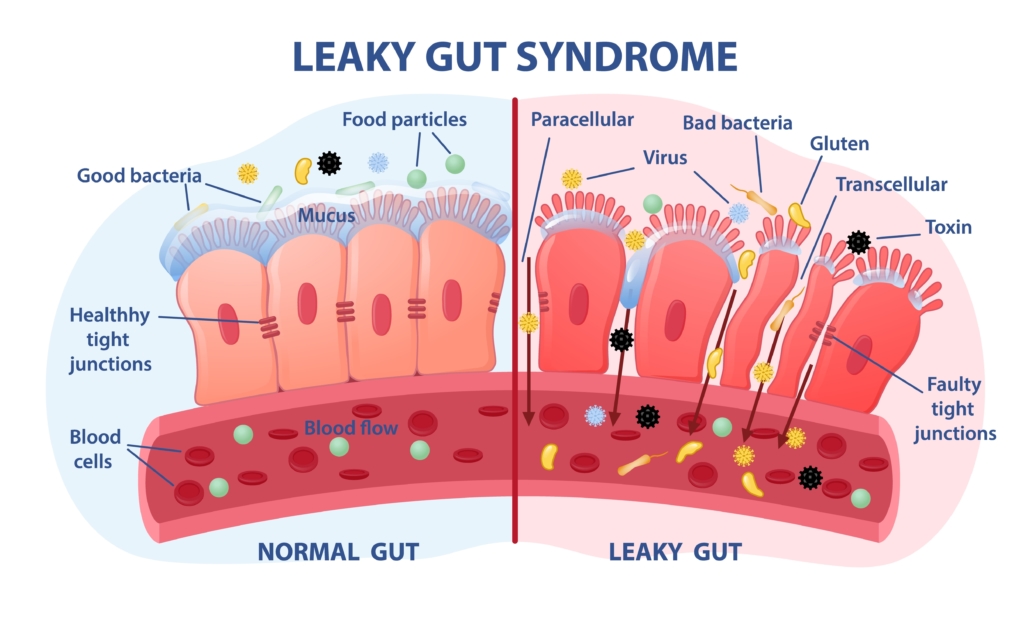
The Carnivore Diet Can Enhance Testosterone and Libido
The modern American diet and lifestyle is the perfect prescription to put a serious damper on your testosterone and libido levels. Too much sugar and refined oils, paired with not enough activity and a little extra weight create a vicious cycle that depletes testosterone and can leave your strength, energy, and libido in the tank.
But the carnivore diet is loaded with a plethora of nutrients like cholesterol, protein, and Vitamin D that are essential to the production and synthesis of healthy testosterone levels. Plus, it’s nearly impossible to hang on to loads of excess body fat on the carnivore diet – further promoting a healthy uptick in testosterone and libido.
The Carnivore Diet Can Boost Your Brain Power
Inflammation is like kryptonite to your brain. It can cause brain fog, dull your mental clarity, contribute to depression and anxiety, and worsen mental disorders. The carnivore diet not only cuts out inflammation boosting foods like sugar, refined oils, and simple carbohydrates – it also actively decreases inflammation.
Plus, the carnivore diet ensures you’re getting plenty of brain-boosting nutrients like:
- Zinc
- Vitamin B6
- Vitamin B12
- Iron
- DHA
Many dieters who make the switch to a carnivorous diet report increased mental clarity and better ability to focus almost right away.
The Carnivore Diet Can Combat Chronic Disease
Chronic low-level inflammation has been found to be one of the root causes of nearly every chronic disease known to mankind. And thanks to the carnivore diets inflammation-lowering properties, this all-meat diet can aid in combating the development or worsening of chronic diseases like:
- Cardiovascular conditions – like heart attacks and strokes
- Autoimmune disorders
- Metabolic disorders – like type 2 diabetes
- Cancer
- Neurodegenerative diseases – like dementia or Alzheimer’s
- Infertility
The carnivore diet can be a powerful tool in preventing disease and promoting overall health and wellness.
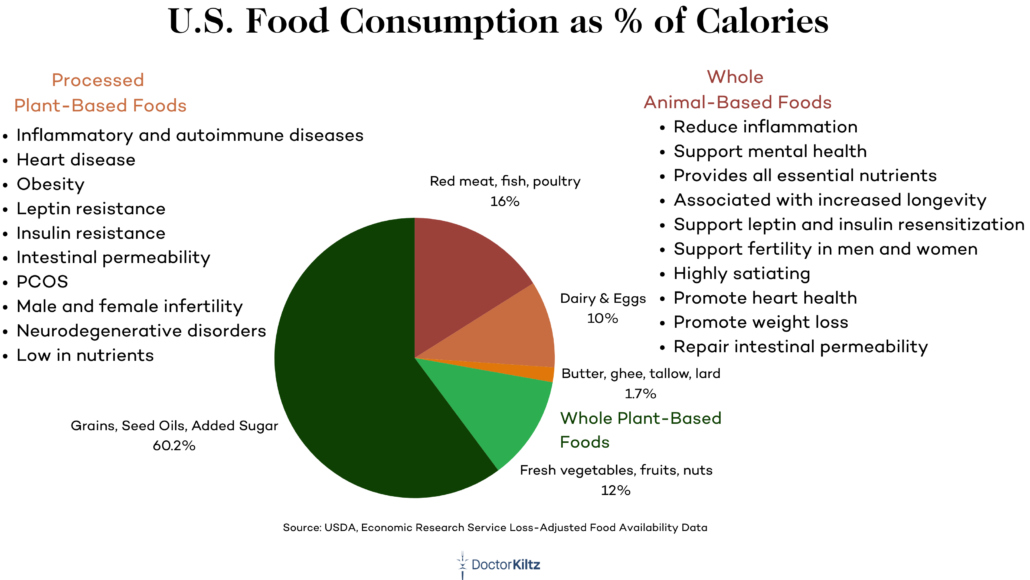
The Carnivore Diet Can Elevate Your Energy Levels
Thanks to certain agricultural practices, an ever-increasing toxic burden, and a modern American diet that’s loaded with processed foods, many people are suffering from nutrient deficiencies and rampant inflammation. And this combination sets the stage for fatigue and less-than-ideal energy levels.
But the carnivore diet removes energy-depleting, inflammation-boosting foods and replaces them with nutrient-dense, energy-boosting foods. The carnivore diet boosts your levels of omega-3 fatty acids, protein, ketones, vitamin B, and carnitine – which are like super fuel for your brain and energy levels.
The Carnivore Diet Can Give You Glowing Skin
You’ve likely been sold the idea that in order to have a beautiful glowing complexion, you need to invest in expensive cleansers, creams, and moisturizers. But the truth is, truly healthy and beautiful skin starts from the inside out. Your skin is the largest organ of your body, so the quality of your diet is often directly reflected in the appearance of your skin.
The carnivore diet zaps inflammation and is full of copious amounts of nutrients your skin needs to thrive, which can improve skin issues like:
- Acne
- Fine lines and wrinkles
- Dry flaky skin
- Eczema or psoriasis
- Redness and blotchiness
- Puffiness
By switching over to a carnivorous diet, you can address the root cause of your skin ailments – leaving you with an effortlessly radiant complexion.
The Carnivore Diet Can Promote Healthy Sleep
Quality sleep is one of the core pillars of health and well-being. Without adequate, high-quality sleep, your body simply can’t function optimally. And the carnivore diet can help you sleep better.
The carnivore diet eliminates the spikes and drops in your blood sugar and energy levels – which can keep you tossing and turning and struggling to fall asleep. The carnivore diet is also loaded with nutrients that help balance hormones associated with a healthy sleep pattern like GABA and melatonin.
So, What Exactly Can You Eat on the Carnivore Diet?
Following the carnivore diet is about as uncomplicated as it gets. It doesn’t require counting calories or macros. And there’s no time wasted trying to figure out if something is “diet approved”. Carnivore approved foods are straightforward and include:
- Meat – of any cut and any kind including beef, poultry, pork, and wild game
- Fish and seafood – any kind is allowed
- Organ meats
- Bone marrow and bone broth
- Fatty meat products – like tallow or lard
The basics of the carnivore diet are simply meat and salt. And while chicken and poultry is certainly allowed, it’s best to keep these meats to a minimum since they tend to have an inferior fat and nutrient composition compared to things like beef, salmon, or wild game. Unless we’re talking about chicken liver–which is packed with nutrients!
Foods to Avoid on the Carnivore Diet
The carnivore diet is built entirely on meat – meaning it excludes all other foods including:
- Fruits
- Vegetables
- Vegetable oils
- Grains like rice, oats, barley, etc
- Flour and flour products like bread, pasta, pastries, etc.
- Chocolate (sorry)
And while things like hot dogs, salami, sausage, and other processed meats are technically meat, they are also a “no-go” on the carnivore diet. These modified meat products are typically chock-full of questionable ingredients and additives like nitrates and nitrites – so they don’t quite make the cut when switching to the carnivore diet.
Now this list might have you scratching your head thinking, “wait a second, I thought things like fruits and vegetables were supposed to be good for you?” So let’s take a look at why eating plants isn’t quite as healthy as you might think.
The Negative Effects of a Plant-Based Diet
We’ve all heard that fruits and vegetables are essential to a healthy diet. That they are packed full of health-boosting nutrients like essential vitamins and minerals, potent antioxidants, and gut-friendly fiber. But plants also have some other compounds that might not be so healthy.
Plants have evolved with their own survival at the top of their priority list. And since they can’t run away or fight off hungry grazers, they’ve developed their own chemical defense mechanisms. These natural plant toxins include compounds such as:
Our bodies are designed to cope with small amounts of these toxins and certain cooking methods can significantly reduce their levels. But modern nutritional practices have most of us consuming massive amounts of plant-based foods.
We get them in the form of fruits and veggies to grains, nuts, and bread. It’s estimated that on average, Americans eat about 1.5 grams of naturally occurring plant toxins each and every day.
Below, you’ll see a quick overview of some common plant toxins and their possible effects.
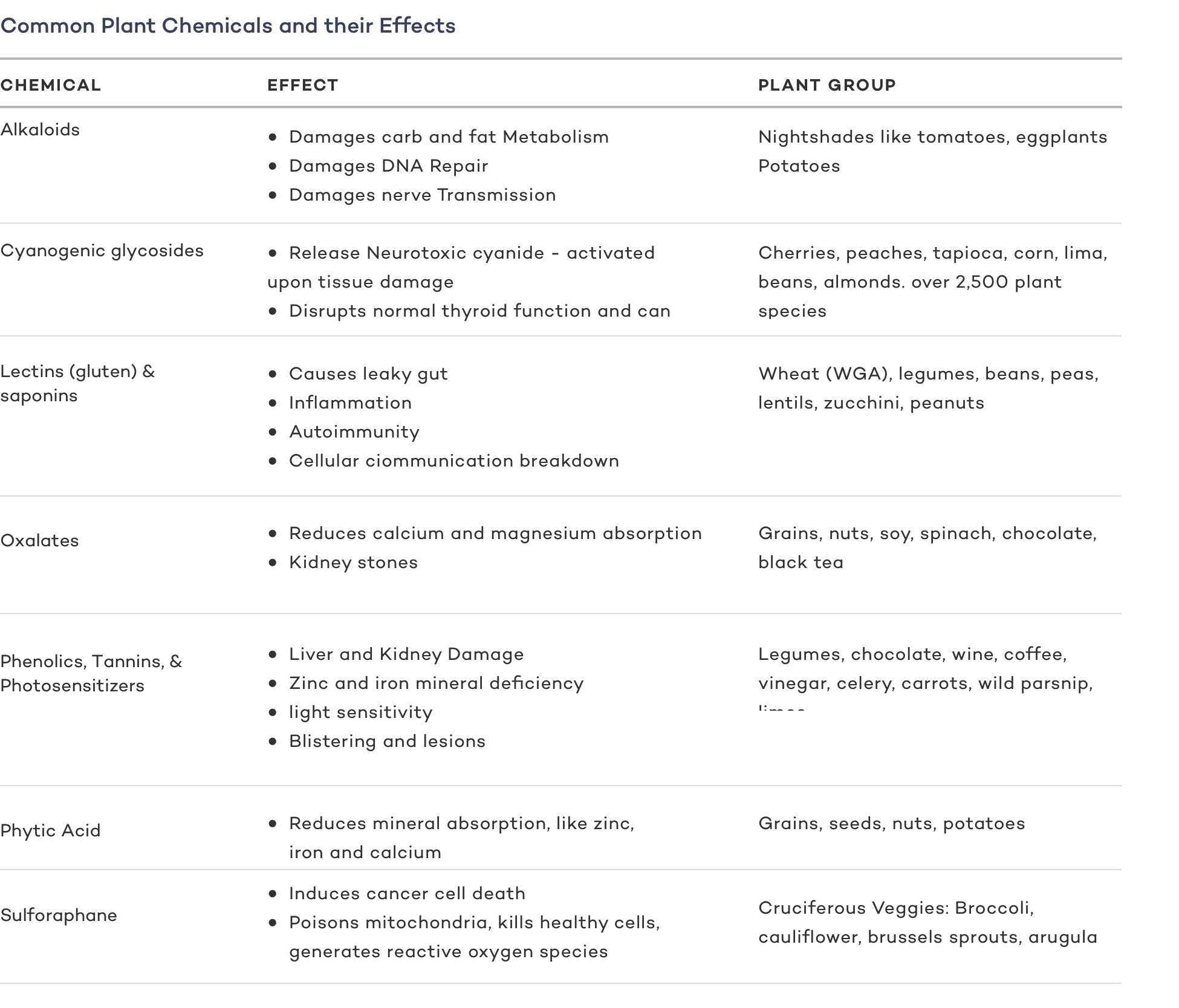
How Much Am I Supposed to Eat on the Carnivore Diet?
One of the best aspects of following a carnivore diet is that there’s no calorie tracking and no going hungry. Following the carnivore diet simply allows you to tune into your body and eat until your full.
The majority of carnivore dieters end up consuming between 1-2 pounds of meat a day – but most find it unnecessary to measure portions.
It’s also important to ensure you’re eating plenty of fat. On a carnivore diet, you can run the risk of eating so much protein that your body converts it to glucose (a simple carbohydrate, and using it for fuel instead of breaking down fatty acids into ketones.
This process is known as gluconeogenesis. Simply ensuring that you’re eating fatty cuts of meat will prevent your body from converting protein into sugar.
When Am I Supposed to Eat on the Carnivore Diet?
There’s no right or wrong way to time your meals when following the carnivore diet, you can eat whenever you feel like it. But the carnivore diet does pair perfectly with another dietary practice that has some astounding health-boosting benefits – intermittent fasting.
Intermittent fasting – or intermittent feasting as we like to call it – is a way of cycling between periods of eating and fasting. This can mean fasting for 16 hours a day and allowing yourself an 8-hour eating window. Or you could follow a one meal a day (OMAD) intermittent feasting plan and pack all of your eating into a single meal.
For women, there are also specific IF techniques that you can learn more about here
Combining the impressive benefits of intermittent fasting and the carnivore diet can pack a powerful punch when it comes to your health.
Carnivore Diet Meal Plan and Shopping List
Eating a strictly carnivorous diet makes your grocery hauls and meal planning about as easy as it gets. Take a look at the following charts to get a basic idea of what a weekly shopping list and meal plan might look like.
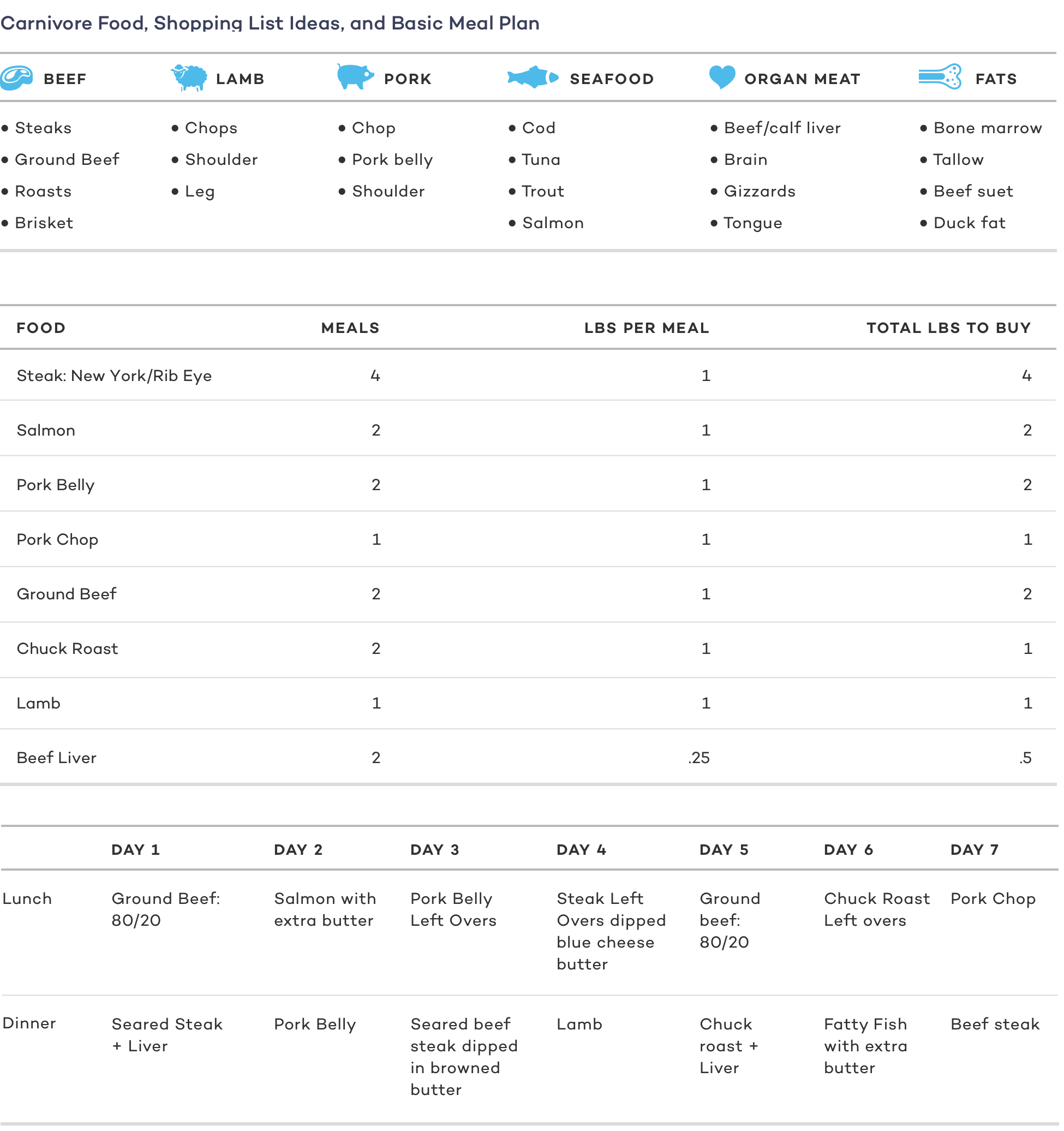
Does the Carnivore Diet Create Any Nutrient Deficiencies?
If you’re eating a well-formulated carnivore diet, the answer is no! Trying to subsist strictly on one or two cuts of meat could potentially lead to nutritional deficiencies. But regularly integrating a diverse range of animals, cuts of meat, and especially organ meats provides you with more than enough micronutrients to not only survive but thrive.
In fact, one of the highlights of the carnivore diet is its impressive ability to reverse nutrient deficiencies.
Our digestive tracts and bodies still function the same way our primarily carnivorous ancestors did. We are designed to survive and flourish on the most nutrient-dense sources of fuel on the planet – meat.
The following charts reveal how our digestive tract is designed to support a meaty diet, and the impressive nutritional profile of animal products versus plants.
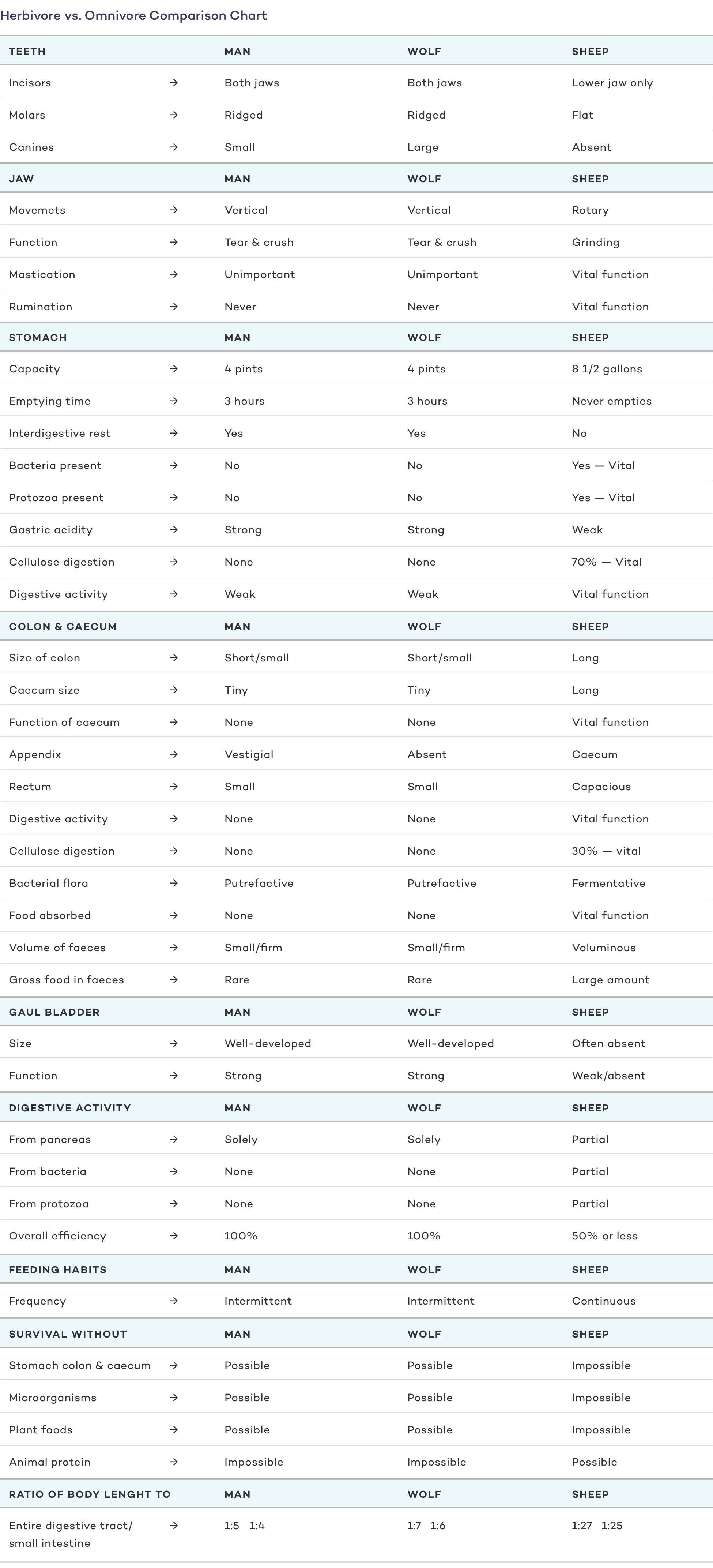
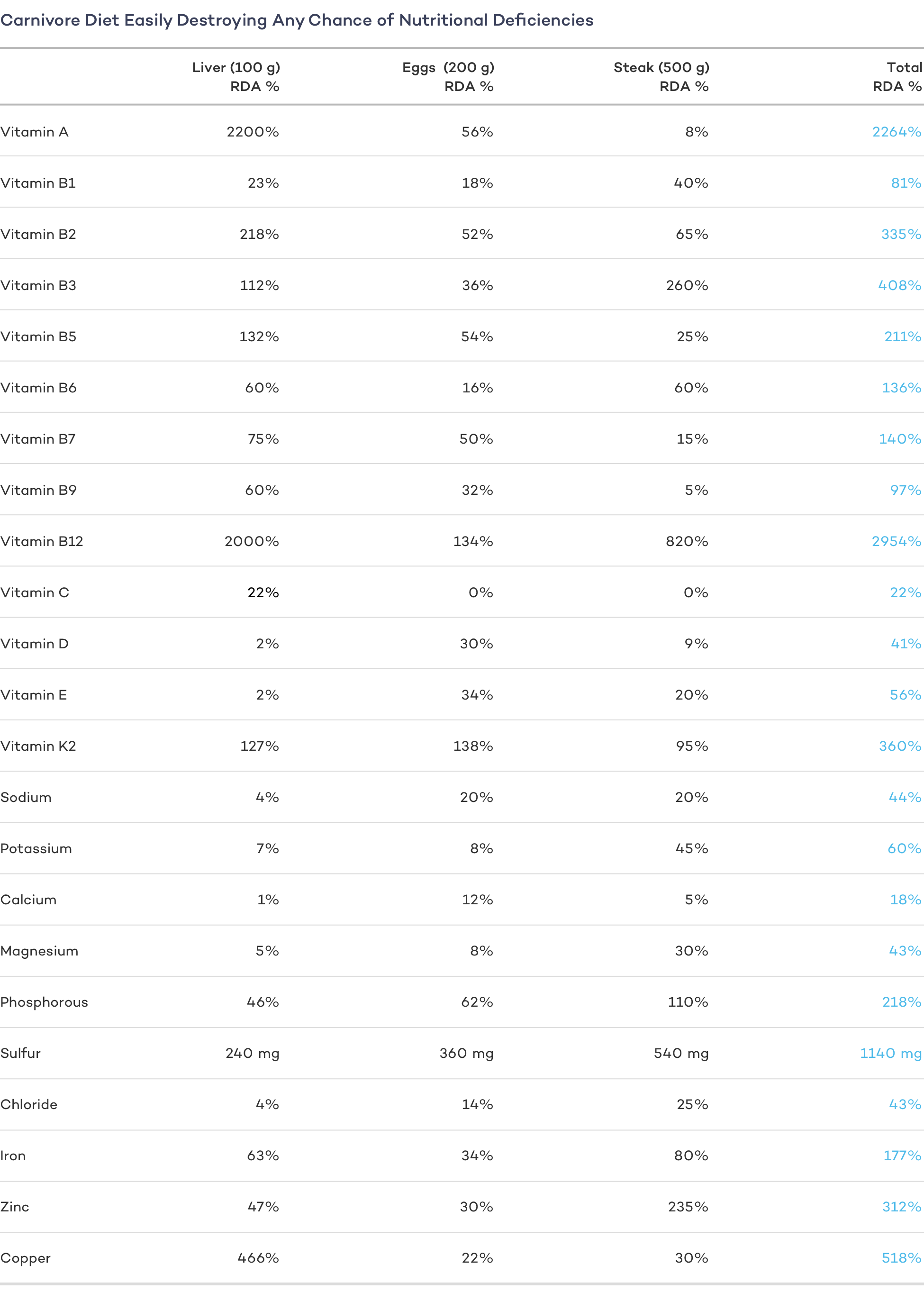
Does Switching to the Carnivore Diet Have Any Side Effects?
Besides making vegan angels fall from heaven, likely nothing serious. Whether or not you have any negative side effects when switching to a carnivore diet will likely depend on your diet and lifestyle prior to making the transition.
If you’re already eating a well-rounded low-carb diet, or following a ketogenic diet, chances are you won’t have many or any side effects.
But if you’re jumping into the carnivore diet straight from a diet high in carbohydrates and sugar, there’s a good chance you’re going to feel crummy before you feel better. As your body adjusts to having all carbs and sugar eliminated you may experience fatigue, headaches, and generally feeling “under the weather”.
But the good news is, this transition period typically only lasts anywhere from a few days to a couple of weeks. Once your body calibrates to your new and improved diet, you’ll start experiencing all of the positive benefits associated with an all-meat diet.
Carnivore Diet Frequently Asked Questions
You might still have some unanswered questions when it comes to the carnivore diet. So let’s dive into some of the most commonly asked questions and address any doubts you might have about taking the plunge into an all-meat diet.
What About Fiber – Don’t I Need it?
The need for fiber is one of the most pervasive and harmful dietary myths. We’ve been indoctrinated with the misconception that the fiber found in plants and grains is essential to our health. But this couldn’t be further from the truth.
In fact, high fiber diets can:
- Inhibit nutrient absorption
- Disrupt your gut flora – leading to dysbiosis
- Increase the risk of intestinal issues like diverticulitis and bloating
Switching to a low or no fiber diet can be one of the most beneficial things you can do for your health. So if you’re hesitant to switch to the carnivore diet because you’re worried about constipation or gut health – don’t be. Just take a look at the chart below to see the effects of reducing dietary fiber on your digestive tract.
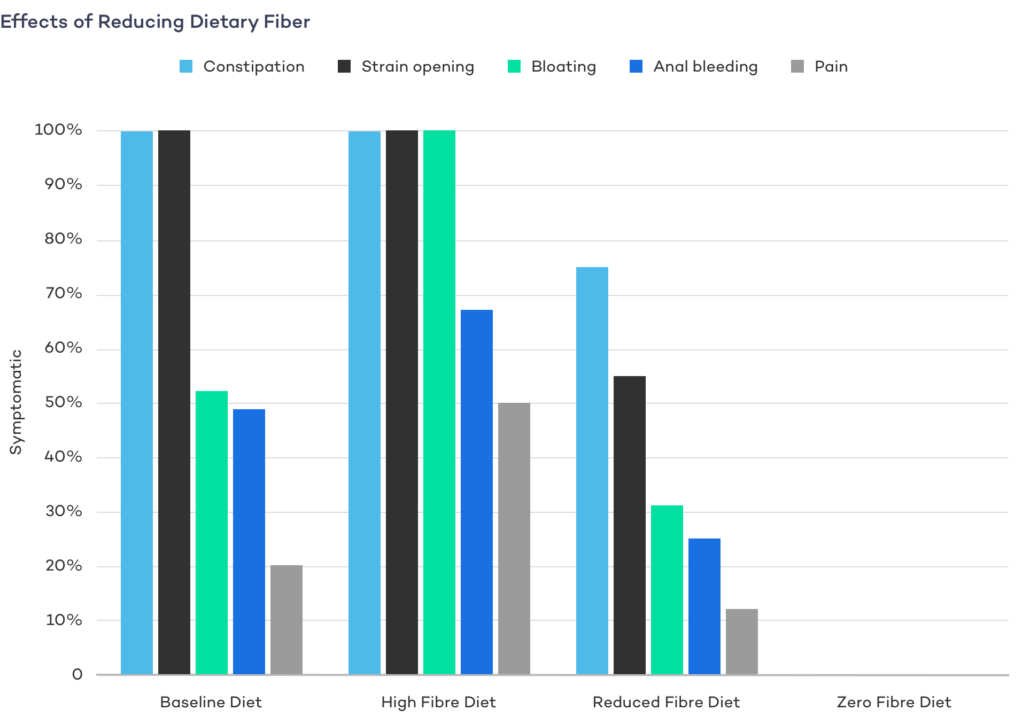
What About Vitamin C – Will I Get Enough on the Carnivore Diet?
The required daily intake for Vitamin C is vastly different for someone following a standard American diet and someone following a carnivore diet. That’s because glucose (sugar) and Vitamin C compete for absorption. What that means is if you don’t have any sugar in your diet, you have significantly more bioavailable Vitamin C.
So the Vitamin C you obtain from nutrient-dense organ meats will provide you with plenty of this essential vitamin when you don’t have a ton of sugar blocking your ability to utilize and absorb it.
Does the Carnivore Diet Put You in Ketosis?
The answer is – it depends. Ketosis is a metabolic state that takes place when your body shifts into using fat as its primary source of fuel rather than carbohydrates. When your body doesn’t have any carbohydrates to burn for energy, your liver will begin oxidizing fatty acids – transforming them into molecules known as ketones, or ketone bodies, which serve as a form of energy.
Typically you will reach a state of ketosis in two ways:
- By fasting and limiting your intake of any fuel – thus forcing your body to use up your own stored fat as a source of energy
- Consuming a diet consisting primarily of fat – forcing your body to rely on fat rather than carbs
Obviously consuming carbohydrates will quickly snap you out of ketosis. But too much protein can also shift your body out of a state of ketosis via gluconeogenesis.
So whether or not you enter a ketogenic state while following a carnivore diet will depend on exactly how much fat and protein you’re consuming. This can be a point of confusion between the carnivore diet and the ketogenic diet, so let’s take a little deeper look at the differences between these two.
What’s The Difference Between The Carnivore Diet and The Ketogenic Diet?
The carnivore diet is more restrictive and quite simple compared to the ketogenic diet. The carnivore diet focuses solely on eliminating all food sources that are not directly animal-based.
The ketogenic diet, on the other hand, emphasizes the consumption of fat – from animal sources, but also plant sources like coconuts, avocados, and olive oil. The ketogenic diet has clear guidelines tracking and limiting the consumption of protein and carbohydrates.
So while there can be some overlap between the two diets, and you will likely enter ketosis at times while following the carnivore diet, there is a distinct difference between these two ways of eating. Carnivore focuses simply on meat, while keto focuses on high-fat and low-carbs.
Is the Carnivore Diet a Fad?
Definitely not! The carnivore diet isn’t something new and it’s definitely not a fad. It’s a way of eating that brings us back to our ancestral roots – back to the way our bodies are designed to function and flourish.
And the amount of science and personal testimonials touting the transformative power of the carnivore diet is growing exponentially. So you can be confident that the carnivore diet is here to stay and will only grow in popularity as more and more people tap into the ancient wisdom of how our bodies are designed to be fueled.
Can I Drink Coffee and Tea?
The answer is – it depends. While technically coffee and tea are allowed on the carnivore diet, it will depend largely on exactly how your body responds to these beverages. Coffee and tea can be pro-inflammatory and can lead to digestive issues like leaky gut syndrome.
It may take some trial and error to figure out what the amount and frequency of coffee and/or tea are right for your body. When switching to the carnivore diet, it may be a good idea to entirely eliminate coffee and tea and slowly add them back in to see how you feel.
Are Dairy and Eggs Allowed?
Again, the answer is – it depends. Eggs and dairy tend to fall into a gray area when it comes to the carnivore diet. Technically things like eggs, butter, milk, cheese, and yogurt come from animal sources and are admissible.
But the problem is, both dairy and eggs can be common allergens and can be pro-inflammatory. Anywhere from 1-3% of the population is allergic to egg whites and a much larger percentage of the population is intolerant to dairy. For this reason, many carnivore dieters limit or omit most egg and dairy products.
Is the Carnivore Diet Right for You?
While there’s certainly no “one size fits all” diet or approach to health, it’s hard to ignore the impressive and compelling benefits that have been linked to the carnivore diet. As the saying goes, the proof is in the (blood) pudding. And the copious amounts of science, along with countless personal testimonials, are proof that the carnivore diet is an all-out game-changer when it comes to your health.
Whether you’re looking to shed a few pounds, boost your energy levels, or address an underlying health condition, the carnivore diet has got you covered. This meaty diet takes it back to the basics, powering your body with the fuel it’s designed to run on and subsequently supercharging your overall health and well-being. So if you’re ready to take your health to the next level, then the carnivore diet just might be the perfect fit.
If you enjoyed this article and are ready to experience optimal health, I encourage you to sign up for my newsletter. All you have to do is enter your information in the form on this page and you’ll get my best tips to help you feel and look your best delivered straight to your inbox.










